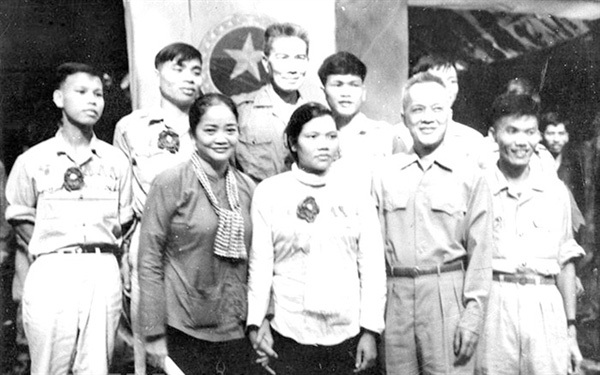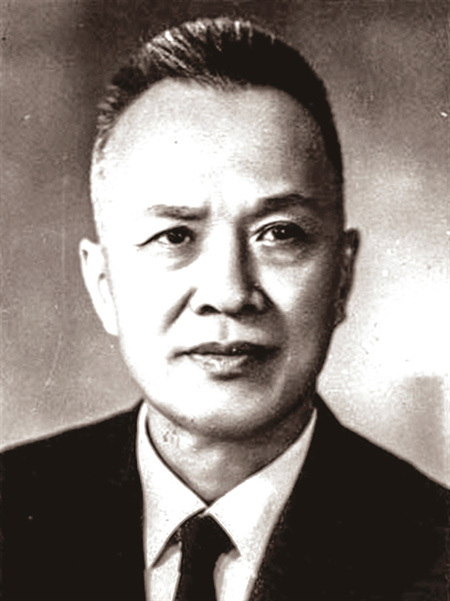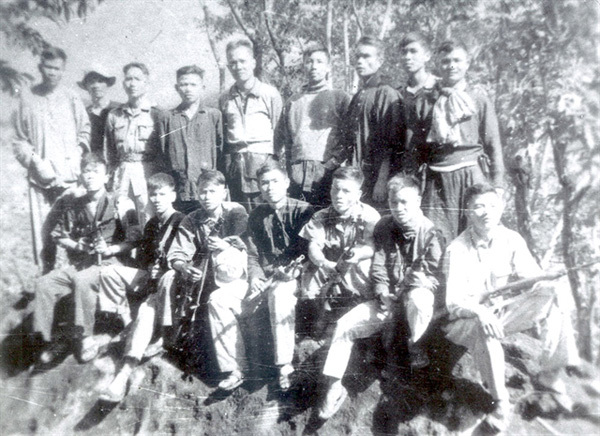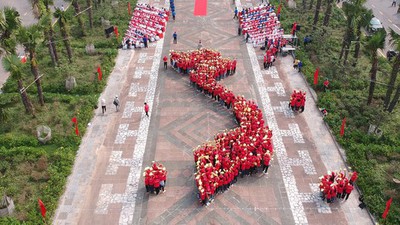wholeheartedly serving the nation's cause of independence and reunification.
 |
| LEADING BY EXAMPLE: President of the South Vietnam National Liberation Front Nguyen Huu Tho (2nd right) with the Tri Thien delegation. Photo courtesy of Liberation News Agency |
He was captured, tortured and sent to prison by the enemy for his patriotism. But he remained indomitable, loyal to revolutionary ideals and believing that victory would come in the end.
 |
| Lawyer Nguyen Huu Tho. |
In his concluding address at the “Nguyen Huu Tho with the Vietnam Revolution and the Homeland of Long An” conference in the Mekong Delta province of Long An, held to mark Tho's 110th birthday in mid-July, Permanent Deputy Prime Minister Truong Hoa Binh highlighted the contributions the patriotic intellectual made.
 |
| MAN OF ACTION: Nguyen Huu Tho (standing, middle) and the Phu Yen Province guerrillas. Photo baophuyen.com.vn |
In his early days as an underground member of the resistance force against the French occupation, Tho worked as a lawyer in Sai Gon (former name of HCM City). With the talent, enthusiasm, and humility of a true intellectual, he became a respected leader of the peace movement in Sai Gon in the early 1950s.
On March 9, 1950, lawyer Tho led a demonstration of tens of thousands of people of all walks of life, mostly young workers and students, to demand democracy, freedom, peace, welfare, and protest against the US involvement in the first Indochina war. Facing this first anti-American protest march in South Vietnam, two US warships docking at Sai Gon Port had to leave.
After the 1954 Geneva Agreement was signed, Tho mobilised civil servants and intellectuals to participate in the peace movement in South Vietnam. Within a short period of time, local peace committees were established throughout markets, schools, factories, as well as in rural areas around Sai Gon.
Lawyer Tho gradually gained trust by lovers of peace, democracy and independence in South Vietnam, and for those activities he was arrested by the Sai Gon administration several times.
The National Front for Liberation of South Vietnam was established in December 1960. At that time, he was under house arrest in Phu Yen Province by the Ngo Dinh Diem administration.
After being freed by the revolutionary forces in October 1961, lawyer Tho went to the resistance base in Tay Ninh Province, and there he was elected Chairman of the Central Committee of the National Front for Liberation of South Vietnam.
In June 1969, he was appointed Chairman of the Advisory Council of the Provisional Revolutionary Government of South of Vietnam.
He was admired by his comrades-in-arms and the people for his profound political stance, and for upholding the banner of great solidarity for national independence and reunification.
Following the liberation of South Vietnam and the country’s reunification, he was elected Vice President of the Socialist Republic of Vietnam in June 1976.
He held more important posts as Acting President of the Socialist Republic of Vietnam in April 1980, and Chairman of the National Assembly and Vice Chairman of the State Council of the Socialist Republic of Vietnam in July 1981.
At the 3rd National Congress of the Vietnam Motherland Front in November 1988, Tho was elected Chairman of the Front’s Central Committee. In August 1994, at the Fourth National Congress of the Front, he was elected as Honorary President of the Presidium of the Central Committee.
He made important contributions to the formation of the Party’s renewal policy, directed and participated in drafting the Constitution in 1992, and offered a host of suggestions on modernising the state apparatus, the National Assembly, and the Motherland Front. VNS

Southern region thrives after 45 years of reunification
After 45 years of national reunification and three decades of the Doi Moi (renewal) process, under the leadership of the Party, southern provinces and cities’ economy have thrived dramatically.

“I love my country” journey 2020 launched
The Central Committee of Vietnam Youth Federation has announced the journey titled "I Love My Country" for 2020 which will run from the National Reunification Day (April 30) - National Day (September 2).
 With extraordinary patriotism and energy, lawyer Nguyen Huu Tho overcame many temptations and the constraints of society at the time to become a leader of the South Vietnam liberation force,
With extraordinary patriotism and energy, lawyer Nguyen Huu Tho overcame many temptations and the constraints of society at the time to become a leader of the South Vietnam liberation force,